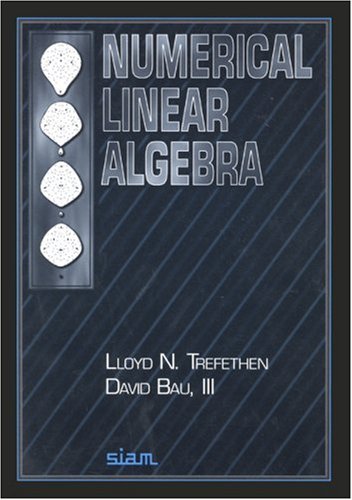Computational Methods
for Equation Solving
and Function Minimization
for Equation Solving
and Function Minimization
- Lectures
are MWF 12:20pm-1:10pm, at Colburn 046
- Instructor: Francisco-Javier Sayas (here's my website)
- Office
hours: MW 2pm to 3pm and by appointment
- Website. www.math.udel.edu/~fjsayas/teaching/math612
- Textbook: Numerical Linear Algebra by Lloyd N Trefethen and David Bau
Course
description
LU and QR factorizations, singular value and eigenvalue decompositions, matrix conditioning, solution of linear systems and linear least-squares problems, iterative methods in linear algebra, descent and quasi-Newton methods of optimization, globalizing convergence, constrained optimization, applications.
Evaluation
The final grade will be composed of two exams (each of them containing an in-class and a take home part), and a certain number of assigned problems and numerical experiments to take home.
Check the continuously updated calendar at the main page of the course website for concrete dates of quizzes and exams.
Part of the grade will reflect the quality of the argumentation and the clarity of its exposition. Grading will be very strict in terms of the quality of writing, especially in long exams. Writing has to be 100% logic and precise, good use of notation is mandatory, and gaps in argumentation will be penalized.
Attendance and deadline policy
Attendance to lectures is mandatory and will be checked on random dates. The students are expected to tell the instructor if they are going to miss a lecture, giving a good reason for it. Deadlines for the take-home part of the midterm exams will be strict.
Academic honesty
As worded by the University of Delaware All students must be honest and forthright in their academic studies. To falsify the results of one's research, to steal the words or ideas of another, to cheat on an assignment, or to allow or assist another to commit these acts corrupts the educational process. Students are expected to do their own work and neither give nor receive unauthorized assistance. Any violation of this standard must be reported to the Office of Student Conduct. For more details, check http://www.udel.edu/stuguide/13-14/code.html Unless you are asked to do so in a concrete assignment, you cannot collaborate with your colleagues in assignments and projects. Cheating of any kind (even if the student does not take any advantage from it) will be grounds for an F grade.
LU and QR factorizations, singular value and eigenvalue decompositions, matrix conditioning, solution of linear systems and linear least-squares problems, iterative methods in linear algebra, descent and quasi-Newton methods of optimization, globalizing convergence, constrained optimization, applications.
Evaluation
The final grade will be composed of two exams (each of them containing an in-class and a take home part), and a certain number of assigned problems and numerical experiments to take home.
Check the continuously updated calendar at the main page of the course website for concrete dates of quizzes and exams.
Part of the grade will reflect the quality of the argumentation and the clarity of its exposition. Grading will be very strict in terms of the quality of writing, especially in long exams. Writing has to be 100% logic and precise, good use of notation is mandatory, and gaps in argumentation will be penalized.
| EXAMS |
500 |
250
each (two exams) |
| PROBLEMS |
250 |
5
graded assignments (50 points each) |
| CODE |
250 |
5
graded assignments (50 points each) |
| TOTAL |
1000 |
Attendance and deadline policy
Attendance to lectures is mandatory and will be checked on random dates. The students are expected to tell the instructor if they are going to miss a lecture, giving a good reason for it. Deadlines for the take-home part of the midterm exams will be strict.
Academic honesty
As worded by the University of Delaware All students must be honest and forthright in their academic studies. To falsify the results of one's research, to steal the words or ideas of another, to cheat on an assignment, or to allow or assist another to commit these acts corrupts the educational process. Students are expected to do their own work and neither give nor receive unauthorized assistance. Any violation of this standard must be reported to the Office of Student Conduct. For more details, check http://www.udel.edu/stuguide/13-14/code.html Unless you are asked to do so in a concrete assignment, you cannot collaborate with your colleagues in assignments and projects. Cheating of any kind (even if the student does not take any advantage from it) will be grounds for an F grade.
